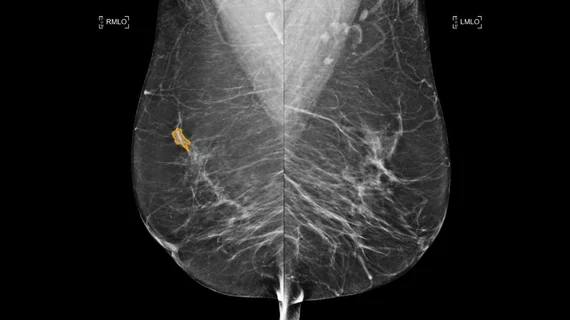AI loaded onto mammography systems can flag possible cancers in real time to speed workflows
Patient anxiety from mammography recalls and the need to wait for scheduled follow-up exams or biopsies is an issue many women's imaging centers are trying to avoid. Artificial intelligence (AI) embedded directly in the breast imaging systems might be one way to enable faster care to eliminate the wait and to help speed same-day workflows for additional imaging or biopsies.
MedCognetics Inc. said this week it successfully tested and implemented the first embedded AI cancer detection system built into a mammography system. The embedded solution eliminates latency, delivering immediate, high-quality image analysis, a significant improvement over traditional setups that require external workstations or cloud-based processing. This approach may improve patient outcomes through faster results, enhanced image quality and reduced hardware costs.
The vendor gained U.S. Food and Drug Administration clearance for its CogNet QmTriage AI in September 2022, which can be integrated directly into a full-field digital mammography (FFDM) system and flag exams where there is a suspected cancer. This can enable exams to be flagged for priority reads so patients can get additional screenings or a biopsy while at the imaging center, rather than notifying patients later and requiring them to schedule a different appointment.
The technology implemented this week is the company's upgraded CogNet AI-MT technology, which employs advanced AI and machine learning (ML) to detect early signs of cancer across all ethnicities and can be deployed on customer premises, in the cloud, or via the web. The platform is FDA 510(k) cleared for triage of mammogram images. The system uses the Nvidia IGX Orin medical-grade edge AI platform alongside CogNet AI-MT. The algorithm was trained on a diverse global dataset to enhance the performance of radiologists and help improve patient outcomes worldwide, the company said.
MedCognetics said the AI offers complete analysis in the radiology workflow, on premise, reducing the wait time for results. AI-driven enhancements improve the clarity and detail of images without requiring high-end, expensive hardware. The vendor said it is a cost efficiency solution for medical device manufacturers to achieve high-end image quality at a fraction of the cost by utilizing AI rather than upgrading hardware. The AI cans also help practices with workflow optimization by enabling worklist prioritization.

